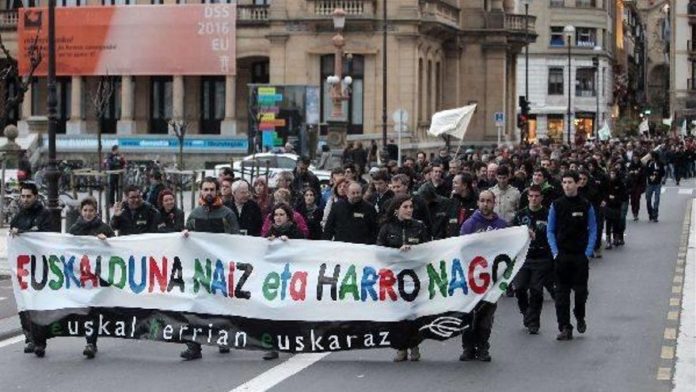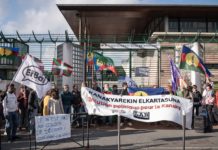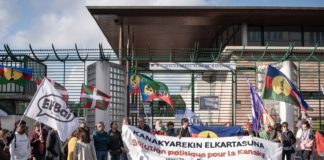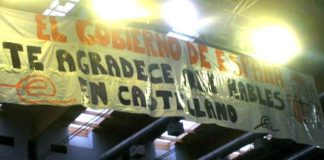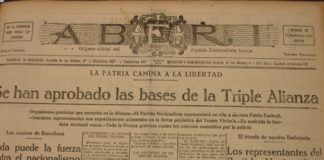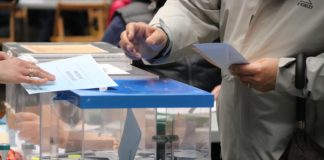Note for our international readers: In the Basque language, Basques who speak our own language are called “euskaldun”. A Basque-speaker never calls himself “vasco” (in Spanish) or “Basque” (in French), but “euskaldun”. “Euskaldun” is neither a demonym nor a geographical concept, but an ethnic and linguistic concept.
As a consequence of suffering a long linguicide and colonization, the national personality of Euskal Herria (The Basque Country) has been notably weakened in the last 150 years, and since then we have slipped down the tragic slope of assimilation. Our situation was very different in 1843, when the French writer Victor Hugo visited us: “But am I really in Spain? Hardly anyone is Spanish in Donostia-San Sebastian, everyone is Basque. This is Gipuzkoa, the old territory of the fueros, the old free Basque provinces. It is good to know how to speak a little Spanish, but here the Basque language is spoken above all“. And when he visited Pasaia (a town near Donostia) he added this: “Here you are born Basque, you speak Basque, you live in Basque and you die in Basque. The Basque language is here the homeland, almost a religion, I would say. Say a word in Basque to a peasant; before doing so, you were barely a human being to him; after speaking Basque to him, you are his brother. Here Spanish is a foreigner, just like French.”
Because of the savage globalization and the perverse political discourse imposed on us by the two oppressor states (Spain and France), it is more and more difficult for us to talk about our identity. And what the Basque speakers of Victor Hugo’s time were very clear about, we Basque speakers today see as much more diffuse. What is our identity? It is time to proclaim our Basqueness without shame, and to say it loud and clear: we are not “Basques” or “Navarrese”, but “Euskaldun”. Because language gives us individual and collective identity, it gives us our particular vision of the world. Language shapes our thinking. Language makes us what we are.
Since the times of Sabin Arana (founder of Basque nationalism in the 19th century) the discourse of Basque nationalism, with some exceptions, has mixed the terms “Basque” and “Euskaldun”. And this shows that the original nationalism did not speak in Basque, did not think in Basque. Arana used to say: “the Basques are not Spanish or French, we are Basques“. And we say: “we Euskaldun are neither Basque nor Navarrese, we are Euskaldun“. The Basque language is our homeland, because we live in the Country of the Basque language (Euskal Herria).
Our ancestors knew very well what their identity was based on, what was the essence of their personality. They were Euskaldun. Today, this seems more complicated, even though the terminology is clear. In neighboring languages, for example, no distinction is made between the demonym and the speaker of the language: thus, when we say “Spanish” we do not distinguish between the speaker of the language and the inhabitant. The same is true when we say “Catalan”, “French”, “Galician” or “Corsican” (“español”, “català”, “français”, “galego” or “corsu”, in the respective languages). In Basque, on the other hand, the difference is clear: identity is associated with language, not with place of birth or residence.
We cannot accept the terminology imposed on us by the imperialists, we cannot assume that “Basque” is a sub-category within Spanishness, like “Andalusian”, “Castilian” or “Aragonese”. On the other hand, “euskaldun” is an ethno-linguistic concept that goes beyond the Spanish or French frame of reference. It is what identifies us, it is what is ours.
In a normalized national community there is no individual who has a dual identity. Therefore, among us it should be impossible, under normal conditions, to be “euskaldun” and “basque” at the same time. Those who dominate us want us to believe that these two concepts are synonymous, that they are equivalent, that we have a dual identity. And some of us believe it. It is very significant what recently happened to the PNV leader Joseba Egibar, when in a political event in Donostia-San Sebastian he said that “the Basque language is what makes us euskaldun” (“euskara da euskaldun egiten gaituena”, in Basque). A statement that requires no further explanation to us all was incorrectly translated into Spanish by the press officers of the PNV, in the official note that they sent to the media in Spanish: “Euskera is what makes us Basques“. Such a clumsy translation -which reflects the degeneration of our national thought- caused a real earthquake in Spanish unionist circles. These are the unfortunate consequences of not being clear about basic concepts.
We do have it clear: the identity of the Basque-speaking nation is based on language. And the political nation, the Basque Republic that we want to achieve, must be built on that linguistic and cultural nation. We fully agree with the opinion of Joxe Manuel Odriozola: “political sovereignty cannot be built on the abstract will of the citizens. The matrix of the ethno-cultural nation must inevitably be the seed of the political project, otherwise it can neither germinate nor grow“. A Basque patriotic political project that does not take into account the Basque-speaking nation, that instead of language places other elements at the base of its political formulation, is pure fraud, since language is the maximum collective creation of a People, and the most effective tool that a nation has to avoid its assimilation.

